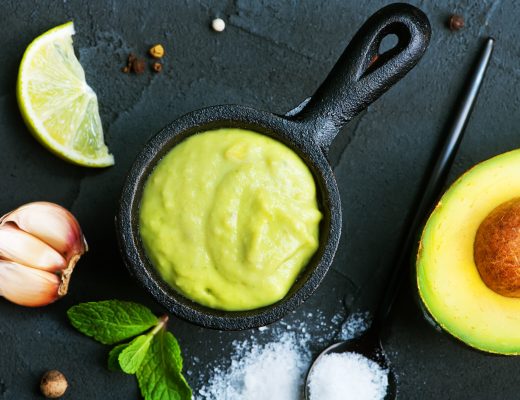Gut health is so important for overall health. You have trillions of bacteria living in your gut (that’s 10 times more bacteria cells in our body than human cells!) The bacteria living in your gut play so many roles; from aiding digestion, controlling your weight, supporting your immune system to producing neurotransmitters like serotonin (the “happiness” hormone). Your probiotic helps keep your entire body healthy.
The best time to take a probiotic is on an empty stomach right before you go to sleep. The goal is to get anywhere from 5 to 100 billion Colony Forming Units (aka CFUs), to the large intestine. If you take a probiotic with food, your stomach becomes more acidic in order to break down the nutrients from your food and the acidity can limit the number of CFUs that make it to their destination- the large intestine.
Tip: Leave the probiotic by your bed so you don’t forget it.
If you’re taking antibiotics, don’t make the mistake of taking your antibiotics and probiotics at the same time. Otherwise, all the good bacteria from the probiotic can get killed off by the antibiotic. Wait at least two hours after taking your antibiotic to take your probiotic.
The different probiotic strains
There are hundreds of different types of bacteria all classified as probiotics and different strains can have different effects. For the greatest probiotic benefits, it’s imperative to select a probiotic that has specific strains that have been studied to help with your specific issue.
The two most recognized and utilized probiotics come from the genus Lactobacillus and the genus Bifidobacterium. These are the most studied strains of bacteria from these families. In addition there is also a popular probiotic yeast called Saccharomyces boulardii.
Lactobacillus acidophilus: Studies have positively associated L. acidophilus with helping to aid in digestion, reduce cholesterol levels, improve immunity, reduce symptoms of eczema, and prevent vaginal infections.
Lactobacillus reuteri: When used therapeutically, one study showed that it decreased the oral bacteria that cause tooth decay. Other studies have linked L. reuteri to improving symptoms of acid reflux, reducing respiratory and gastrointestinal infections and managing women’s health issues such as urinary tract infections, yeast infections and overall improvement of the vaginal flora.
Lactobacillus rhamnosus: Studies have found that L. rhamnosus can help in specific conditions such as eczema, cystic fibrosis, allergic rhinitis, and bacterial vaginosis. More generally, supplementation with this strain has shown to reduce digestive discomfort and other symptoms of IBS. Lactobacillus rhamnosus has been studied to help prevent colon cancer and reduce chemotherapy induced diarrhea.
Bifidobacterium animalis: Research has found B. animalis is useful in helping with gastrointestinal issues such as reducing bloating, preventing constipation and fighting food-borne bacteria. It’s also been shown to have positive effects on the immune system and metabolism in animal studies.
Bifidobacterium lactis: Specific strains of B. lactis have been linked to supporting the digestive tract, reducing allergies and relieving occasional constipation.
Bifidobacterium longum: B. longum is most known for its antioxidant properties and the ability to aid in digestion by breaking down carbohydrates. Studies have shown that this strain can help reduce depression and anxiety and help reduce symptoms of IBS. Similar to L. acidophilus, B. longum also helps maintain healthy cholesterol levels.
Saccharomyces boulardii: This particular probiotic is actually a yeast, which is a type of fungus. Saccharomyces boulardii has been clinically studied to help treat a variety of gastrointestinal disorders and symptoms in addition to acne, high cholesterol, urinary tract infections, and yeast infections. Yes, it’s a yeast that helps treat other yeasts!
While specific strains have specific benefits, there is a clear overlap in many of their uses. This is often why probiotics are created to be “broad spectrum” meaning they contain a combination of multiple, well-studied strains to provide optimal and diversified benefits.
In my practice, I like to run specialty lab testing like stool cultures and microbiome testing to help see which strains would be the most beneficial for my clients. When I know what’s going on in your gut, I can better help restore, replenish and diversify your unique gut flora.
If you’re using probiotics for a specific health condition, talk to your functional md about finding the right probiotic for you.
If you are not my client and you are not taking a probiotic yet, find a high-quality broad spectrum probiotic supplement which are usually made up of at least three different kinds of bacteria. Your gut microbiome is diverse, so it’s a good idea for your probiotic to be as well, unless you are using it to treat a specific condition (IBS, constipation, eczema, acne, depression, etc.), in that case you may want a more targeted strain.
Who shouldn’t take probiotics?
While probiotics are generally considered safe, if you have serious illness, probiotics may not be the best option. And if you have Small Intestinal Bacteria Overgrowth (SIBO), I would work with your functional md or nutritionist before starting any probiotic.




